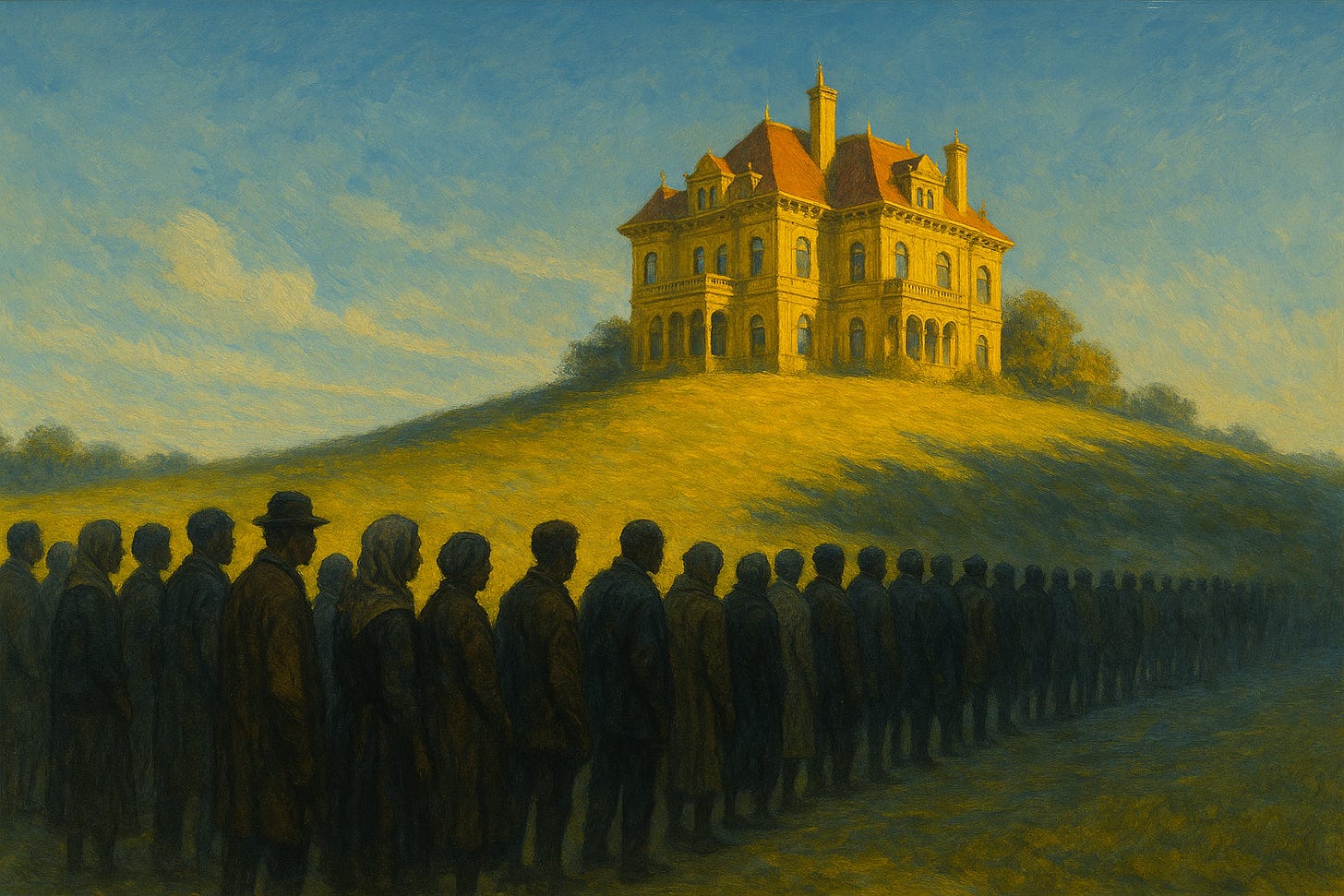Day 8. Prevents Wealth Hoarding / Inheritance Concentration
A democracy that cannot tax its dynasties cannot call itself equal
“The death of democracy is not likely to be an assassination from ambush. It will be a slow extinction from apathy, indifference, and undernourishment.”
— Robert M. Hutchins
The Official Big Beautiful Bill does not confront inequality. It protects it. While cutting food and health aid for the poor, it expands estate tax exemptions for the ultra-rich. While asking more of parents and caregivers, it offers tax delays to landowners selling million-dollar properties. While policing hourly workers for SNAP eligibility, it shields the passive income of elite institutions. This isn’t a rebalancing. It is entrenchment. The bill treats wealth as sacred, inheritance as untouchable, and privilege as exempt from civic contribution. That is not policy drift. It is design. And its effect is devastating: an American tax system that grows more regressive by the year, rewarding the few who already have too much.
Preventing wealth hoarding means recognizing that democracy requires progress—not just between elections, but across generations. That involves taxing large estates, closing loopholes that delay or avoid asset taxes, and ensuring the ultra-wealthy pay more than symbolic percentages. A good measure in this area levels the playing field: it reduces dynastic transfers, taxes passive gains, and affirms that extreme privilege carries civic responsibilities. A bad measure creates permanent exceptions—protecting wealth not only from taxes but from accountability. When laws become insulation, inequality becomes inheritance. And when the tax code turns into a shelter, democracy begins to decay.
This bill does not just fail to slow wealth concentration. It accelerates it. The estate and gift tax exemption—already expanded under Trump—is made larger and permanent. This allows fortunes in the hundreds of millions to pass to heirs without taxation. Farmland capital gains can now be paid in installments, allowing tax deferral for appreciated land assets. The bill expands tax exemptions for stockholders in certain small or qualifying businesses—widening a carve-out that can be used to shield high-value gains from taxation, particularly by early investors and private equity firms. These provisions are not about farmers or entrepreneurs. They are about preserving capital for those who already own the most.
A few provisions hint at fairness. Corporate charitable deductions now require at least a 1% minimum—stopping firms from using small donations to hide large profits. Wealthy private colleges will see a slight increase in tax on their investment income. These are steps in the right direction. But they are not enough to truly address the core problem. The extensive system of tax avoidance—through inheritance, asset step-up, trust restructuring, and passive income exclusion—remains unchanged. The result is clear: the wealthy continue to find permanent ways to stay rich, while others are left with just paperwork.
The rhetoric of fairness falls apart under close review. The small business stock exemption, for instance, is presented as a move to encourage innovation. However, without limits on wealth, it becomes a tool for sheltering long-term capital. You can invest millions, avoid taxes on gains, and pass those gains on to heirs—all without making a real contribution to the tax base. That’s not entrepreneurship; it’s entrenchment. And under this bill, it’s entirely legal.
The step-up in basis—possibly the single most egregious loophole in the U.S. tax code—remains unchanged. Wealthy individuals who die with appreciated assets can transfer them at current market value, wiping out decades of untaxed gains. This isn’t just a missed opportunity; it’s an endorsement. And it sends a harsh message: that the most privileged Americans will not be asked to contribute—neither in life, nor in death, nor through their heirs.
Strategic Sabotage: Preserving the Power of the Ultra-Rich
This bill doesn’t just protect wealth—it canonizes it. By expanding estate tax exemptions and preserving loopholes for investment income and asset transfers, it ensures that today’s billionaires can pass on their fortunes untaxed, untouched, and unchallenged. There is no pretense here of shared sacrifice. While low-income families are asked to work more for less, the richest Americans are granted permanent insulation from the obligations of citizenship. This is not tax reform. It is a retreat from the principle that democracy requires economic mobility—and the humility to tax privilege.
Examples include:
Estate and Gift Tax Exemption Expansion
Farmland Gains Installment Tax Deferral
Expanded Small Business Stock Exclusion with No Wealth Cap
No Changes to Step-Up in Basis or Inherited Asset Taxation
These are not economic errors. They are structural decisions. And they entrench a future in which inheritance matters more than work.
Ten Questions to Ask Republicans
Why increase the estate tax exemption when the top 0.1% already pay less than 3% of wealth in taxes?
What is the public benefit of delaying farmland capital gains tax for multimillion-dollar sales?
Why expand the small business stock exclusion without capping the wealth of participants?
Why make student loans harder to repay while preserving tax shelters for heirs?
Can you explain why passive investment income is taxed less than wages?
What justification do you offer for keeping the step-up in basis for inherited assets?
Who benefits from protecting dynastic wealth while cutting Medicaid and SNAP?
Why do families on public assistance face scrutiny, but billionaires face exemption?
How much revenue will be lost from making the estate tax cuts permanent?
Do you believe democracy can survive when wealth replaces merit?
The OBBB does not just maintain inequality; it solidifies it. Instead of promoting generational fairness, it supports dynastic stability. Instead of equal responsibility, it provides ongoing exemptions. These choices are not unavoidable economic realities; they are political decisions—to shield the wealthy from consequences, even as the poor are repeatedly asked to prove themselves. A democracy cannot survive with a tax system designed to favor heirs over workers. And it cannot claim to be just while wealth continues to grow unchecked, untaxed, and unregulated. The system isn’t broken; it’s functioning exactly as it was designed.





